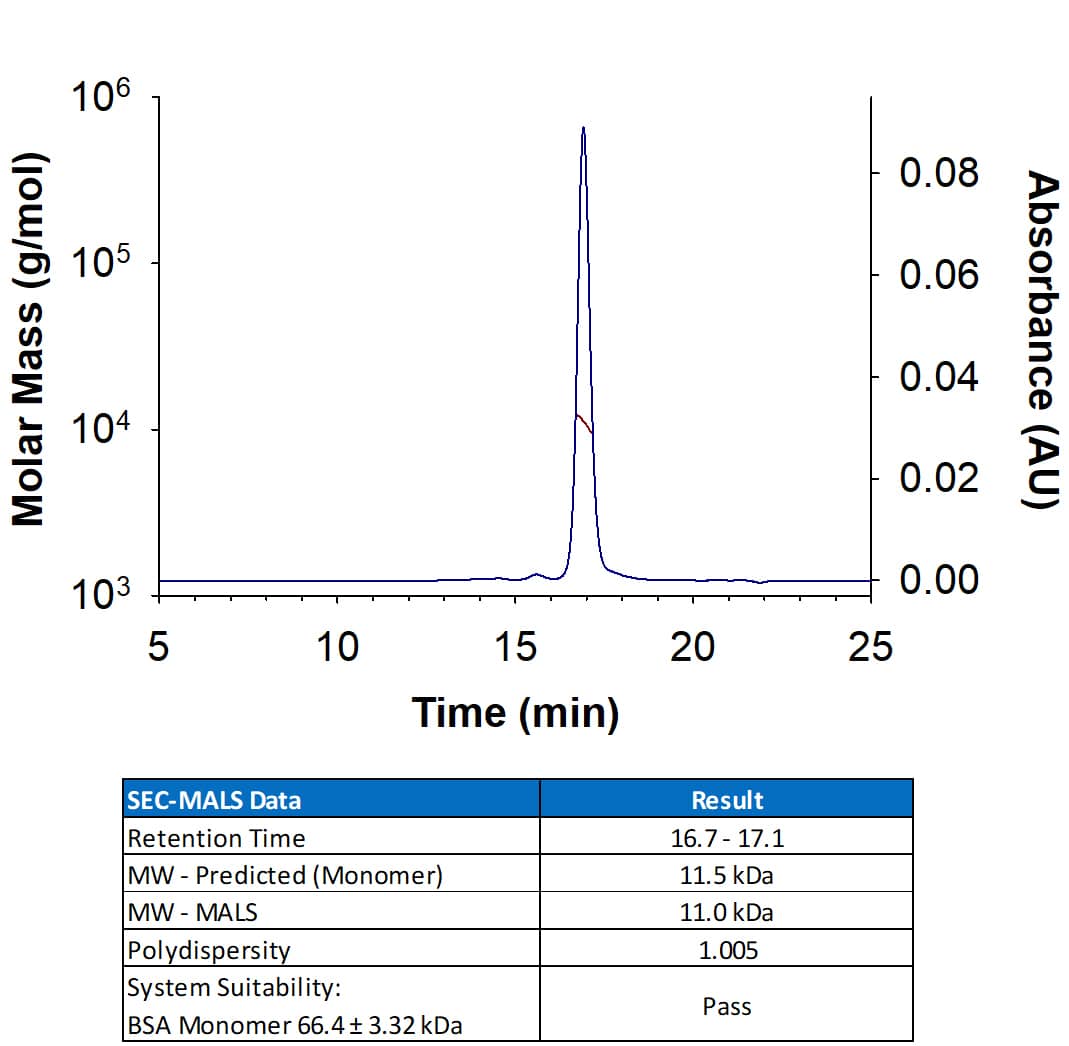Recombinant Mouse IL-13 Protein Best Seller
R&D Systems, part of Bio-Techne | Catalog # 413-ML

Key Product Details
Product Specifications
Source
Ser26-Phe131
Purity
Endotoxin Level
N-terminal Sequence Analysis
Predicted Molecular Mass
SDS-PAGE
Activity
The ED50 for this effect is 0.75-3 ng/mL.
Reviewed Applications
Read 6 reviews rated 4.8 using 413-ML in the following applications:
Scientific Data Images for Recombinant Mouse IL-13 Protein
Recombinant Mouse IL‑13 Protein SEC-MALS.
Recombinant Murine IL-13 Protein (Catalog # 413-ML) has a molecular weight (MW) of 11.0 kDa as analyzed by SEC-MALS, suggesting that this protein is a monomer.Recombinant Mouse IL-13 Protein Bioactivity
Recombinant Mouse IL-13 (Catalog # 413-ML) stimulates cell proliferation of the TF-1 human erythroleukemic cell line. The ED50 for this effect is 0.75-3 ng/mL.Recombinant Mouse IL-13 Protein SDS-PAGE
1 μg/lane of Recombinant Mouse IL-13 was resolved with SDS-PAGE under reducing (R) conditions and visualized by silver staining, showing a single band at 9 kDa.Formulation, Preparation and Storage
Carrier Free
What does CF mean?CF stands for Carrier Free (CF). We typically add Bovine Serum Albumin (BSA) as a carrier protein to our recombinant proteins. Adding a carrier protein enhances protein stability, increases shelf-life, and allows the recombinant protein to be stored at a more dilute concentration. The carrier free version does not contain BSA.
What formulation is right for me?In general, we advise purchasing the recombinant protein with BSA for use in cell or tissue culture, or as an ELISA standard. In contrast, the carrier free protein is recommended for applications, in which the presence of BSA could interfere.
Carrier: 413-ML
| Formulation | Lyophilized from a 0.2 μm filtered solution in PBS with BSA as a carrier protein. |
| Reconstitution | Reconstitute at 50 μg/mL in sterile PBS containing at least 0.1% human or bovine serum albumin. |
| Shipping | The product is shipped at ambient temperature. Upon receipt, store it immediately at the temperature recommended below. |
| Stability & Storage | Use a manual defrost freezer and avoid repeated freeze-thaw cycles.
|
Carrier Free: 413-ML/CF
| Formulation | Lyophilized from a 0.2 μm filtered solution in PBS. |
| Reconstitution | Reconstitute 5 µg vials at 50 µg/mL in sterile PBS. Reconstitute 25 µg or larger vials at 100 µg/mL in sterile PBS. |
| Shipping | The product is shipped at ambient temperature. Upon receipt, store it immediately at the temperature recommended below. |
| Stability & Storage | Use a manual defrost freezer and avoid repeated freeze-thaw cycles.
|
Background: IL-13
IL-13 is a 17 kDa immunoregulatory cytokine that plays a key role in the pathogenesis of allergic asthma and atopy. It is secreted by Th1 and Th2 CD4+ T cells, NK cells, visceral smooth muscle cells, eosinophils, mast cells, and basophils (1 - 3). IL-13 circulates as a monomer with two internal disulfide bonds that contribute to a bundled four alpha-helix configuration (4, 5). Mature mouse IL-13 shares 57%, 75%, and 58% amino acid sequence identity with human, rat, and rhesus IL-13, respectively. Despite the low homology, it exhibits cross-species activity between human, mouse, and rat (6, 7). IL-13 has diverse activities on numerous cell types (8). On macrophages, IL-13 suppresses the production of proinflammatory cytokines and other cytotoxic substances. On B cells, IL-13 induces immunoglobulin class switching to IgE, upregulates the expression of MHC class II, CD71, CD72, and CD23, and costimulates proliferation. IL-13 upregulates IL-6 while downregulating IL-1 and TNF-alpha production by fibroblasts and endothelial cells. IL-13 binds with low affinity to IL-13 R alpha1, triggering IL-13 R alpha1 association with IL-4 R alpha. This high affinity receptor complex also functions as the type 2 IL-4 receptor complex (9, 10). Additionally, IL-13 binds with high affinity to IL-13 R alpha2 which is expressed intracellularly, on the cell surface, and as a soluble molecule (11 - 14). IL-13 R alpha2 regulates the bioavailability of both IL-13 and IL-4 and is overexpressed in glioma and several bronchial pathologies (10, 15, 16). Compared to wild type IL-13, the atopy-associated R110Q variant of IL-13 elicits increased responsiveness from eosinophils that express low levels of IL-13 R alpha2 (17).
References
- Wills-Karp, M. (2004) Immunol. Rev. 202:175.
- Nakajima, H. and K. Takatsu (2007) Int. Arch. Allergy Immunol. 142:265.
- Brown, K.D. et al. (1989) J. Immunol. 142:679.
- Moy, F.J. et al. (2001) J. Mol. Biol. 310:219.
- Eisenmesser, E.Z. et al. (2001) J. Mol. Biol. 310:231.
- Ruetten, H. and C. Thiemermann (1997) Shock 8:409.
- Lakkis, F.G. et al. (1997) Biochem. Biophys. Res. Commun. 235:529.
- Wynn, T.A. (2003) Annu. Rev. Immunol. 21:425.
- Andrews, A.L. et al. (2002) J. Biol. Chem. 277:46073.
- Tabata, Y. et al. (2007) Curr. Allergy Asthma Rep. 7:338.
- Chiaramonte, M.G. et al. (2003) J. Exp. Med. 197:687.
- Daines, M.O. and G.K. Hershey (2002) J. Biol. Chem. 227:10387.
- Matsumura, M. et al. (2007) Biochem. Biophys. Res. Commun. 360:464.
- Tabata, Y. et al. (2007) J. Immunol. 177:7905.
- Andrews, A.L. et al. (2006) J. Allergy Clin. Immunol. 118:858.
- Joshi, B.H. et al. (2006) Vitam. Horm. 74:479.
- Andrews, A.-L. et al. (2007) J. Allergy Clin. Immunol. 120:91.
Long Name
Alternate Names
Gene Symbol
UniProt
Additional IL-13 Products
Product Documents for Recombinant Mouse IL-13 Protein
Product Specific Notices for Recombinant Mouse IL-13 Protein
For research use only


